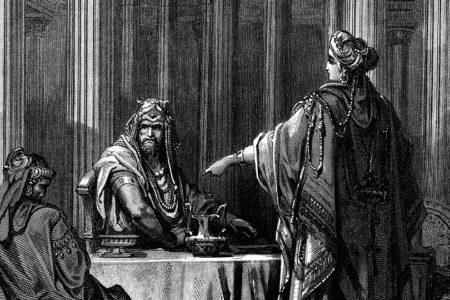Because He Lives
Why future and present blessings depend on Christ’s resurrection from the dead
Listen to Chris Katulka’s interview with Mike Stallard about this article (begins @ 2:34).
Without the resurrection of Jesus from the dead, believers have not been forgiven, believing loved ones who died are lost forever, and Christians live miserable lives.
In fact, Christians live a lie if Jesus is not bodily alive at this very moment: “And if Christ is not risen, your faith is futile; you are still in your sins! Then also those who have fallen asleep in Christ have perished. If in this life only we have hope in Christ, we are of all men most pitiable” (1 Cor. 15:17–19).
We would have to think that God lied to us and that nothing in life really matters. As Bible scholar Charles Swindoll wrote, “If Jesus didn’t come back, alive, from the dead or if His resurrection was a hoax, then nothing—absolutely nothing—has any meaning at all.”1
But the resurrection is not a hoax. It is truth. In space and time during the first century, God sent Jesus to die on a cross and be raised from the dead in the same body in which He died. The entire Christian faith depends on this historical truth even though many Christians “often pay less attention to the resurrection than to the death of Christ.”2 The resurrection serves as the source for both future and present blessings from God, and the importance of this truth must never be understated.
How the Resurrection Affects Our Future
The resurrection actually forces us to look to the future. One day, believers in Christ who have died will rise from the grave just as Jesus did almost 2,000 years ago. He taught us, “Because I live, you will live also” (Jn. 14:19).
On that great day, every believer will receive a transformed (glorified) body fashioned like Christ’s resurrection body, one that cannot sin or die (Phil. 3:20–21). Among the grandest words in the whole Bible are Jesus’ words about Himself (and our future) as He prepared to raise His friend Lazarus from the tomb: “I am the resurrection and the life. He who believes in Me, though he may die, he shall live” (Jn. 11:25). Jesus’ resurrection points powerfully to the future resurrection of all those who know Him. God has made a promise He will not break. God does not break His promises.
WHAT HAPPENS AFTER LIFE?
Want to know what else the Bible says will happen when we die? Check out What Happens After Life? By Ron Rhodes.
Because of the future hope we have in our own resurrection, we can have strong assurance that we will go to be with the Father in heaven when we die: “We are confident, yes, well pleased rather to be absent from the body and to be present with the Lord” (2 Cor. 5:8).
Believers who are alive when Jesus comes to rapture the church will not experience death (1 Cor. 15:51–52; 1 Th. 4:13–18). They will be glorified and ascend to the Father’s house with everyone who died in Christ and is raised from the dead. At Christ’s Second Coming to Earth, all believers will claim their inheritance in the earthly Kingdom of God (Rev. 19—20).
Another future benefit of the resurrection involves our believing loved ones who have gone to heaven before us. It is quite natural for us to wonder about them as we suffer the pain of separation. But remembering that Jesus is alive and has promised that we also shall live reminds us we will hug their necks again. We will enjoy their presence forever.
The overwhelming presence of the risen Christ among us will make such everlasting joy and fellowship possible. In my younger days, I found such descriptions boring. I thought, What will I do in eternity? Just hold hands and sing songs? Now that I know the Bible better, I know God will assign us remarkable projects based on the extremely personal relationships He has with us individually and the rewards He gives us. Jesus described these duties in wonderful, administrative terms: “You . . . have authority over ten cities” (Lk. 19:17). There is so much to look forward to because Jesus is alive.
How the Resurrection Affects Us Today
Belief in Christ’s resurrection is not merely pie-in-the-sky hope for tomorrow. Benefits in the here and now abound because Jesus was raised from the dead.
We have the biblical doctrine of justification, which refers to the declaration that believers are innocent of their sins. God declares a lost sinner “not guilty” when he or she places complete faith in Christ.
Justification is not a future hope; it is a past transaction with God that has a present ramification in this life. We stand righteous before God today and for all time. According to Romans 4:25, our justification stems from Christ’s resurrection from the dead. Thus, because Christ is alive, we can live in the assurance that God does not hold our sins against us. We can live forgiven lives.
The apostle Paul, however, went further; he longed to grow in his knowledge and experience of Christ until the time of his own resurrection: “that I may know Him and the power of His resurrection” (Phil. 3:10). He knew Jesus’ resurrection provides a power source for everyday Christian living. We, too, should crave “resurrection power” to live for the Lord today.3
Another glorious benefit is the courage Christ’s resurrection brings to the Christian life. Such bravery shone in the early church as the resurrection “empowered the early Christian community with incredible courage in the face of seemingly impossible obstacles and terrifying threats. Why? Because their trust was not in this broken world but in the risen Christ present with them as they sat together ‘at the Lord’s Table’ or faced the wild animals of the Roman Colosseum.”4
Such courage is available to believers everywhere as we follow Him earnestly. As a result, we can face the world with hope even in the midst of the deepest sorrow (1 Th. 4:13–18).
In the cursed world we live in, we face the obscene specter of death every day. Death is a great enemy. But Christ has defeated this horrible foe. He has removed its stinger. As a result, Christians can live today unafraid of death: “O Death, where is your sting?” (1 Cor. 15:55).
The raising of Jesus the Messiah from the dead has given those of us who trust in Him hope for tomorrow and peace for today. And nothing on this Earth could be better than that.
ENDNOTES
-
- Charles R. Swindoll, “What the Resurrection Gives Us,” insight.org, March 10, 2015
<tinyurl.com/yadp3puh>. - Steven D. Mathewson, Risen: 50 Reasons Why the Resurrection Changed Everything (Grand Rapids, MI: Baker Books, 2013), 12.
- Richard R. Melick, Jr., Philippians, Colossians, Philemon, The New American Commentary (Nashville: Broadman Holman, 1991), 135.
- Thomas C. Oden, “The Event Named Resurrection” in The Book of Jesus, ed. Calvin Miller (Nashville: Broadman Holman, 1998), 429.
- Charles R. Swindoll, “What the Resurrection Gives Us,” insight.org, March 10, 2015









The text of the Bible does not tell us who did and did not see the dove descending upon Jesus or hearing the voice of God. We can only make some educated guesses by deduction from other passages. At the Mount of Transfiguration when the voice of God says the same thing, Peter, James, and John heard it (Matt. 17:5-6). So perhaps others around the baptism of Christ heard the voice of God and saw the dove. But we don’t know for sure and should not be dogmatic. Thanks for thinking about the biblical text.
Mark tells us when Jesus was baptized and came out of the water, the Holy Spirit descended upon Him and the voice of God spoke.
Did others than Jesus and John see and hear this?
Thank you.
What an awesome and encouraging message!
Thank you
Your Eternal Brother